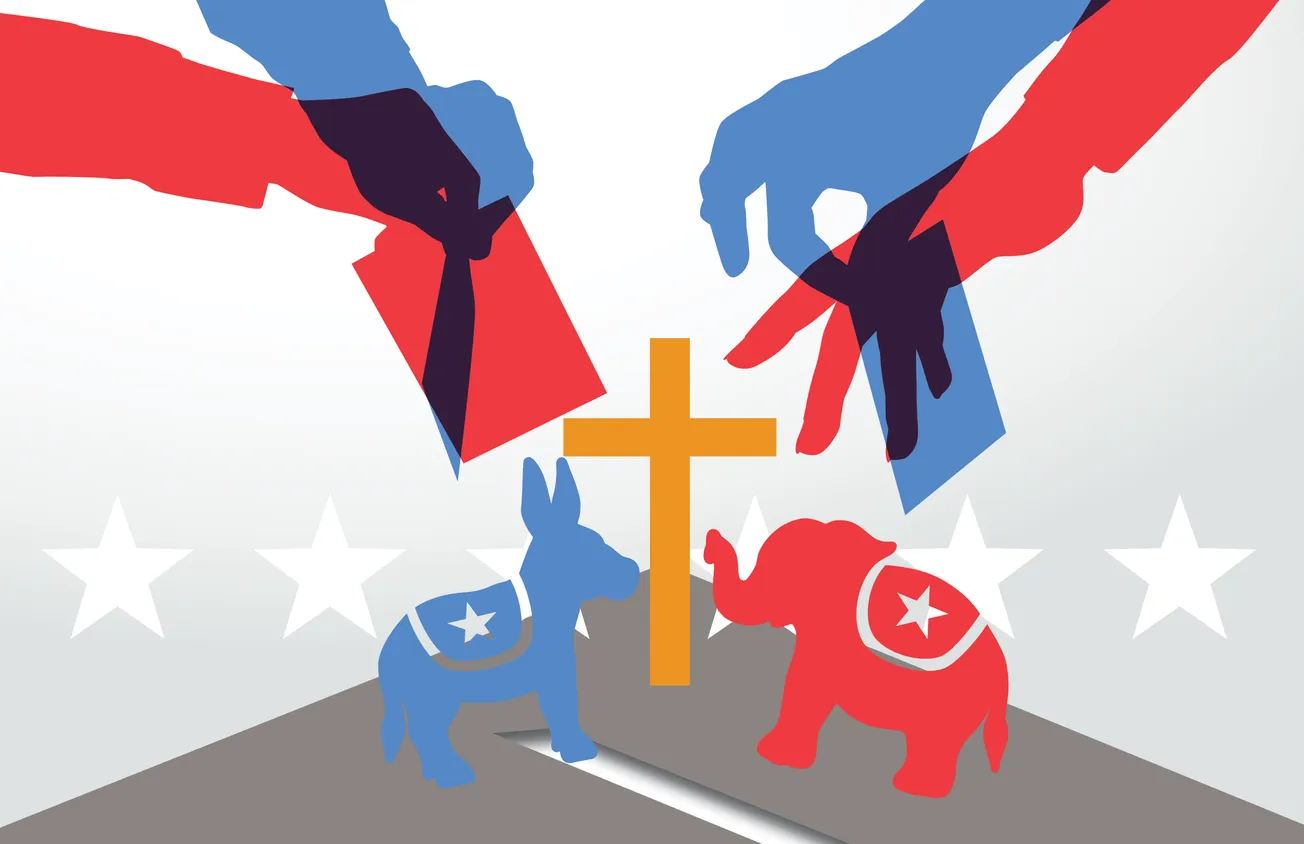Every four years, when we vote for president, we brace ourselves to be bombarded with news and updates about the top candidates.
We receive a myriad of campaign advertisements, phone calls, and text messages asking us to commit to a vote or send money. Our social media timelines are filled with advertisements and links to think pieces on which candidate is the best. And it doesn’t stop there—campaign emails, podcast episodes, and 24-7 news cycles fill our heads with presidential slogans, opposing party attacks, and promises that the other candidate is a threat to the future of our country.
To follow the presidential campaign this year is to be an anxious American citizen. Just in the past two months, a poor debate performance ultimately led President Biden to drop out of the race, there was an assassination attempt on former president Donald Trump, and Vice President Kamala Harris is now the presumptive Democratic presidential nominee. With all the back and forth, Catholics are called to bring their faith to the ballot box.
Being a Catholic voter is no easy task. Our faith speaks to both liberal and conservative values and isn’t represented cleanly in any American political party. As politics become more divisive and siloed, it can create riffs between families, neighbors, and faith communities.
The U.S. bishops' teaching document “Forming Consciences for Faithful Citizenship” calls Catholics to participate in the political process by focusing on four principles drawn from Catholic social teaching: the infinite worth and dignity of all human life, the common good, solidarity, and subsidiarity.
While this guide is meant to help Catholics choose elected officials regardless of party affiliation, most of us already know who we are voting for on election day (Tuesday, Nov. 5). Democrats and Republicans are drastically divided, with the top two presidential candidates having distinctly different visions for America. Partisan media and algorithms only stoke the flames of division and bias throughout our country.
So how do we bring our faith to the polls in today’s political climate? How do we have conversations with people who feel differently than us? How do we bring some sort of unity back to our communities when it comes to politics?
The following three actions can help us navigate this political season and those that follow, with the hope of building a more unified country and world.
Reconnect with the Catholic faith
This isn’t just about going to church on Sunday, but reconnecting with the living example Jesus was for all of us. Re-read the Beatitudes, the Ten Commandments, and the life of Jesus in the Gospels. Participate in a church ministry and do volunteer work. Take part in the sacraments. Spend time with God in prayer and reflection. It can be helpful to reconnect with God in word and deed to help refocus your spiritual journey.
Be cautious of faith-based political rhetoric
Researchers are carefully following how different demographics are voting, particularly Christians. This data is being used in political messaging and can be a manipulative tactic to gain voters. When we listen to any politician who uses faith-based messaging, we must ask ourselves:
- Is this message rooted in the true meaning of my Catholic faith and Jesus’ example of how to live?
- Does the candidate’s record and actions mostly reflect Catholic values and the church’s stance on social justice?
- Does the candidate speak and act in ways that unify or divide our country?
We must also be careful of how political faith-based rhetoric appears in our parishes, among church leaders, and in our own voices. We must hold ourselves and each other accountable to share the true teachings of our faith and not repeat political banter simply because it sounds good or is convenient.
Get out of your comfort zone
It is natural for humans to seek community. But we must stretch ourselves to have discussions with people beyond those who think the same way we do. Read an opinion article by an author with beliefs that are different from yours. Find news from an unbiased source or one different from what you normally watch. The result is not necessarily to change your beliefs or views, but to help all of us gain understanding of one another.
God made each one of us in his image, even those we disagree with. Our faith calls us to find ways to build community, to create space for hope, and to share the message of Jesus. We must be living examples of Christ even when the world around us is divisive, angry, and unable to find common ground.
Whether someone is a Democrat, Republican, Independent, or undecided, they are our neighbor. When we remember that God cares about us and our lives at every age and stage, we can begin to see each other not as foes but as fellow human beings.
May this political season be an invitation to draw closer to Christ and unity within our country.
Samantha Smith is a copy and content writer based in Atlanta. She worked for the Archdiocese of Atlanta for nearly a decade in various roles, including as a staff writer for The Georgia Bulletin, where she won numerous Catholic Press Awards for her writing and social media campaigns. Connect with Samantha by following her Catholic blog, Spirit and Sparkle, and her Twitter/X at @BeimaxCreates.






